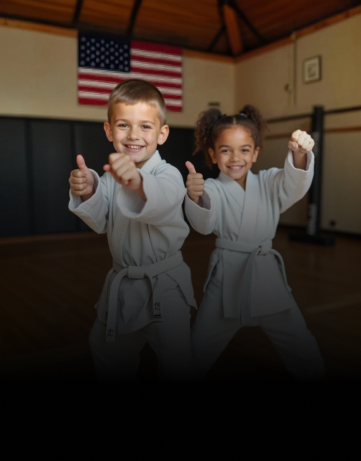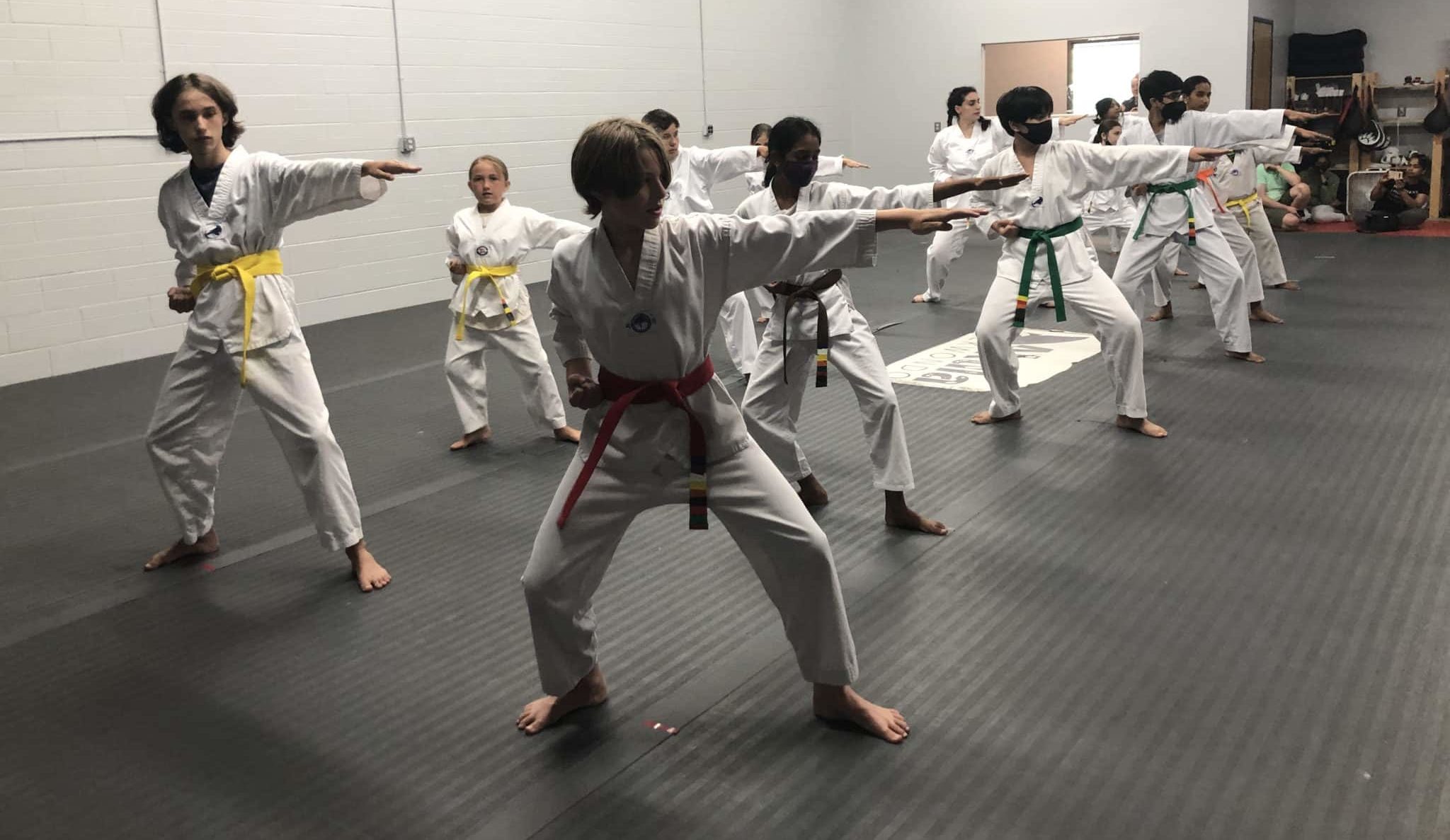Family Martial Arts – Share Fitness and Fun as a Whole Family
Wiki Article
Exactly How Martial Arts for Kids Can Increase Self-confidence and Discipline in Youthful Martial Artists
Karate for children provides an one-of-a-kind opportunity to develop self-confidence and discipline in young martial artists. As they discover brand-new techniques and face difficulties, they not just obtain skills however additionally develop a strong sense of self-respect. This organized environment motivates them to value the trip of improvement. Exactly how does this training equate right into their daily lives? Discover the much deeper connections that make karate greater than simply a sporting activity.The Value of Self-confidence in Childhood Advancement
Self-confidence is a vital building block in childhood development. When you nurture your child's self-confidence, you equip them to deal with difficulties, take dangers, and reveal themselves easily. Youngsters with self-confidence are a lot more going to discover brand-new tasks and social scenarios, which can cause enduring friendships and useful experiences.Encouraging your kid to step out of their comfort area cultivates strength. They discover that failure isn't the end but instead a tipping rock to success. By celebrating their achievements, regardless of how tiny, you assist them acknowledge their capabilities and worth.In this journey, support and positive support from you play a vital duty. Whether it's via appreciation or merely being existing, your involvement boosts their self-confidence. As they expand, this self-assurance ends up being a lifelong asset, equipping them to browse both obstacles and chances with a strong sense of self.How Martial Arts Shows Self-control and Focus
Martial arts helps you construct self-control and focus via its structured training routine. As you exercise mindfulness during each session, you'll find out to concentrate far better both on and off the floor covering. And also, establishing and achieving objectives in karate enhances your capacity to stay conscientious and committed.Structured Training Program
While you take part in karate training, you'll quickly find exactly how an organized program infuses technique and emphasis in young practitioners. Each course follows a certain format, consisting of warm-ups, technique practice, and sparring. This consistency shows you to devote and appreciate the process to enhancement. As you learn methods and types, you develop a sense of obligation for your very own progress.The organized environment urges you to establish goals, whether understanding a brand-new belt or developing a kata. You'll find that remaining concentrated throughout drills and classes sharpens your concentration. The self-control you grow in karate expands past the dojo, positively affecting your schoolwork and everyday routines. Each session enhances the relevance of dedication, helping you become an extra self-displined individual.Mindfulness in Method
As you practice karate, you'll discover that mindfulness comes to be a crucial part of your training. Each step needs your complete attention, aiding you remain concentrated on the here and now moment. You'll find out to disregard diversions and focus on your breathing, motions, and intents. This enhanced understanding hones your reflexes and improves your discipline.During sparring or forms, you'll find the value of being psychologically present - Karate Salisbury MD. You'll observe how this focus not only boosts your technique yet likewise builds your confidence. By exercising mindfulness in karate, you cultivate persistence and resilience, important qualities that extend past the dojo. In this method, karate educates you to harness your mind, assisting you establish a disciplined method to obstacles both on and off the floor covering
Goal Setup Techniques
Establishing goals in karate isn't almost making belts; it's an effective way to grow discipline and focus. When you establish details, achievable targets, you create a roadmap for your progression. For instance, instead of simply aiming to boost your kicks, try focusing on understanding a particular strategy each month. This technique keeps you inspired and engaged.Breaking down larger objectives into smaller, convenient steps helps you track your progression and celebrate little triumphes along the method. Whether it's perfecting your stance or increasing your sparring endurance, every goal enhances your commitment. As you accomplish these objectives, you'll construct confidence in your abilities and create a solid feeling of discipline that prolongs beyond the dojo right into day-to-day life.Structure Strength Through Martial Arts
Martial arts, especially karate, uses children a distinct chance to develop durability in an encouraging setting. In classes, they face challenges that push their limits, whether it's sparring or mastering a new technique with a partner. Each setback, like a missed kick or a shed suit, comes to be an opportunity to find out and grow.As they exercise, youngsters discover to accept discomfort and keep trying, also when points obtain hard. They find that failure isn't the end; it belongs to the trip. This attitude assists them recuperate stronger, check my site not simply in the dojo, yet in daily life.With each difficulty they conquer, your child builds self-confidence in their capacity to take on challenges, fueling their determination. Via martial arts, they'll comprehend that durability isn't just about physical toughness; it's concerning psychological grit and determination, encouraging them to deal with whatever life throws their way.The Role of Regard in Martial Arts Training
Respect is a foundational principle in karate training, promoting a culture of technique and friendship among pupils. When you step onto the dojo flooring, you're not just finding out methods; you're also finding out to respect your teachers, peers, and the art itself (Karate Salisbury MD). Bowing at the beginning and end of course isn't simply a formality; it represents your acknowledgment of others' initiatives and dedication.As you create mutual regard, you'll find it enhances your discovering experience. You'll listen extra attentively to your teacher and gain insights from fellow students. This atmosphere encourages useful criticism and support, enabling everyone to expand together.Moreover, respect grows self-discipline. Recognizing the worth of effort and humility aids you stay focused on your training. Consequently, this regard converts into your daily life, improving your interactions and relationships outside the dojo. With martial arts, you find out that respect is essential for personal development and area buildingAttaining and setting goals Success in Karate

Social Skills and Team Effort in the Dojo
While training in the dojo, youngsters normally create essential social skills and teamwork abilities. As they exercise alongside peers, they learn to interact successfully, share room, and assistance one an additional. Each course offers possibilities for cooperation, whether it's throughout companion drills or team workouts. This synergy cultivates relationships and produces a feeling of belonging, making the dojo a nurturing environment.Kids also gain important conflict resolution skills. When they encounter challenges, such as differences during sparring, they find out to navigate these situations constructively. They exercise patience and compassion, understanding that everyone has different toughness and weaknesses.Moreover, taking part in team activities grows a feeling of liability. You'll see your kid learning to depend on teammates and take responsibility for their role in a team. These experiences not only enhance their martial arts trip but additionally equip them with social tools they'll lug right into various other locations of life.
The Long-Term Conveniences of Karate Beyond Youth
As youngsters mature and change right into adulthood, the benefits of martial arts extend far past the dojo. You'll locate that the discipline and emphasis found out through karate can equate right into your scholastic and professional life. Establishing and attaining goals in martial arts promotes a solid job ethic, which can push you to stand out in any type of endeavor.Moreover, the self-confidence obtained from competing and grasping methods can boost your self-worth, helping you tackle challenges head-on. This resilience ends up being vital as you encounter the unpredictabilities of adulthood.Additionally, the social abilities created via synergy and camaraderie in the dojo can lead to better partnerships in both individual and expert rounds. You'll discover to interact effectively, willpower problems, and build a supportive network.Ultimately, karate shapes not simply experienced martial artists, yet well-shaped people prepared to handle the world.Frequently Asked Inquiries
What Age Is Ideal to Begin Karate for Kids?
You can begin martial arts as very early as age four or 5, yet it commonly depends upon your child's maturation and passion. Discovering a class that suits their age and power level makes a big difference.Exist Any Type Of Health Conveniences From Exercising Karate?
Yes, exercising karate deals countless health and wellness benefits. You'll improve your versatility, toughness, and coordination while increasing cardio physical fitness. Plus, it boosts focus and mental health, making it an amazing selection for overall physical and psychological health.Exactly How Usually Should Kids Go To Martial Arts Classes?
You must motivate your kids to participate in Web Site karate classes at the very least a couple of times a week. Consistency assists them find out techniques successfully and develop skills, making their experience much more satisfying and enjoyable over time.Can Karate Assist With Taking Care Of Stress And Anxiety in Children?
Yes, martial arts can aid manage stress and anxiety in children. It shows emphasis and self-control while supplying a secure outlet for energy. You'll observe your youngster growing much more certain and tranquil as they practice frequently.What Equipment Is Required for Kids Starting Karate?

Report this wiki page